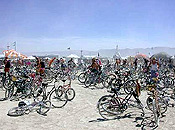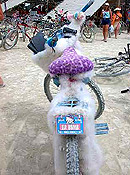The AfterBurn Report has never covered bikes before, but they were the focus of so much activity and we have so much to say about them, we thought it was time. Unfortunately, the message of individual responsibility for bikes remains too often unheard, and theft is a mounting problem. At the same time, a culture of bike waste has slowly developed to the point of strain on our infrastructure. Both issues have forced us to take a look at what services the Project should provide for repairs, collection of lost bikes and restoration to owners, bike storage, and antitheft efforts.
BIKE REPAIR
Bike repair services have been largely community-based, with the understanding that bike owners would bring supplies and that some skilled mechanics would provide public service facilities to aid others. Burning Man has supported a bicycle repair camp in center camp. A few camps have taken this mission to heart and made it their contribution to the greater good to staff repair camps at the two Plazas. Still, other theme camps have provided these services as well. These camps are to be commended. We would like to encourage more of this kind of contribution in the future. These folks are our heroes! (In 2003, however, disturbing reports have surfaced of distorted applications of the “gift economy”, with unseemly and expensive barter demands and even requests for cash payments. We all need to address this issue.)
Center Camp has included a repair camp since 1997, with some support from the Project. This camp has experienced a very high volume of requests, because so many come to our event unprepared and ready to lean on others for service. Mechanics have even heard some folks admit to leaving their bikes without service since the previous year’s event, bringing them straight to the bike repair camp on arrival at Black Rock City. This dependence was never the intention of this modest camp, and it has put great stress on the limited, donated materials available as well as on the psyche of the mechanics, the length of the lines and, ultimately, the demeanor of those offering their services as a gift. Assistance on repairs was, at times, less than friendly.
The intent of this centralized bike repair camp was to encourage alternatives to driving and to promote a bike culture in the aftermath of unnecessary and scary car accidents in 1996, after which all cars other than art cars were banned from driving at the event. To this end, the Project helped to support a much-needed repair service, always with the intent of acting as a catalyst for development of a self-sustaining bike ethic within the community. The bike repair camp was to be a place were people could get support, learn how to repair their own bikes, and share materials, tools, and knowledge. Instead, we created an under funded, overworked camp taken advantage of by less conscientious participants.
Every year there has been less mechanics than needed, and they got burned out. We will not be able to maintain this effort in the future. If the Project supports any bike repair camp, it will be vastly reduced in scope. Instead, we will begin yet another attempt to educate all participants on the value of coming prepared and on the proper respect for and reliance on bike mechanics in a bike-based community. From our perspective, they should be treated as highly valued citizens to be coveted and shared by all.
FOUND BIKES
 After the event in 2002, we realized that excessive amounts of labor, money, and time were consumed by collecting and storing bikes, and reuniting them with their owners post-event. In a 4-year effort, we returned a tiny handful of bikes to their owners and ended up with a mountain of junk bikes at our storage facility. Our goal this year was to bring no bikes back for storage post-event. We accomplished this goal. All of the bikes left on the playa on Monday were collected (most by average, helpful citizens) and brought to Playa Info in Center Camp, where they were inventoried and categorized. Anyone who had lost a bike was able to look for it at Playa Info until Tuesday. About 50 people left the playa with their missing bikes – a complete success compared to years past! People whose lost bikes were not recovered were allowed to choose from those left behind. Next, not-for-profits and art projects that use bikes were allowed to pick up what they wanted. The remaining bikes were loaded into a truck and hauled to the dump in Reno or to San Francisco, where a local not-for-profit, the Bike Hut, was able to restore them to riding condition or use them for parts. The Bike Hut then took a large number of these bikes to a local neighborhood, where they were distributed freely to the needy. All the bikes were gone within hours. What a success compared to our past efforts! A few of the better bikes were left for the Bike Hut to resell or use for higher-end parts.
After the event in 2002, we realized that excessive amounts of labor, money, and time were consumed by collecting and storing bikes, and reuniting them with their owners post-event. In a 4-year effort, we returned a tiny handful of bikes to their owners and ended up with a mountain of junk bikes at our storage facility. Our goal this year was to bring no bikes back for storage post-event. We accomplished this goal. All of the bikes left on the playa on Monday were collected (most by average, helpful citizens) and brought to Playa Info in Center Camp, where they were inventoried and categorized. Anyone who had lost a bike was able to look for it at Playa Info until Tuesday. About 50 people left the playa with their missing bikes – a complete success compared to years past! People whose lost bikes were not recovered were allowed to choose from those left behind. Next, not-for-profits and art projects that use bikes were allowed to pick up what they wanted. The remaining bikes were loaded into a truck and hauled to the dump in Reno or to San Francisco, where a local not-for-profit, the Bike Hut, was able to restore them to riding condition or use them for parts. The Bike Hut then took a large number of these bikes to a local neighborhood, where they were distributed freely to the needy. All the bikes were gone within hours. What a success compared to our past efforts! A few of the better bikes were left for the Bike Hut to resell or use for higher-end parts.
Over all, we are proud of a huge achievement in reuniting people with their lost bikes and redistributing found bikes to the needy without creating more work for the Project. Some participants called or e-mailed asking about lost bikes, and we directed them to a community resource, the e-Playa. We heard that many people were able to locate their bikes with help from other participants.
BIKE THEFT
 In 2002, the Gate and Community Services crews organized a sweep of the city during the burn in the assumption that organized theft was most likely then. We found little noticeable theft between 8 p.m. and 12 a.m. Apparently, bike theft is not confined to any specific time. We did discover that a high percentage of reported bikes thefts happened at the Center Camp Café, indicating either that bikes get swapped or stolen from that location with unusual frequency or that those who lose a bike are more apt to take the short walk from the Café to Playa Info to report it.
In 2002, the Gate and Community Services crews organized a sweep of the city during the burn in the assumption that organized theft was most likely then. We found little noticeable theft between 8 p.m. and 12 a.m. Apparently, bike theft is not confined to any specific time. We did discover that a high percentage of reported bikes thefts happened at the Center Camp Café, indicating either that bikes get swapped or stolen from that location with unusual frequency or that those who lose a bike are more apt to take the short walk from the Café to Playa Info to report it.
In 2003, the main effort to prevent bike theft focused on educating folks of the risk. The Project was broadsided with issues that threatened the survival of our event, so more was not possible. A lovely group of bike enthusiasts stepped up early in the year, placing announcements in the Jack Rabbit Speaks newsletter, collecting and repairing tubes to donate to the repair camp, sharing on a discussion list, and helping out where they could – both on and off the playa. The Project itself could not spare more of its limited resources for such efforts, so an idea to patrol the city for theft gave way to the more pressing needs of a mounting driving problem and, on the night of the burn, of the burning of toxic materials on our community burn pyres.
If we could get participants to leave the American car culture behind and fully adopt a more sensible bike culture, we would probably find our city much safer, with a community personally invested in issues of theft and bike repair. Until that happens, some people will still lean on a fragile infrastructure that has been challenged to the point of collapse. It is time for people to get out of their cars and onto their bikes. This means maintaining their bikes themselves and helping others, as well.
Submitted by
Harley K. DuBois

